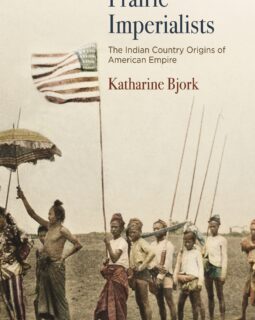Prairie Imperialists: The Indian Country Origins of American Empire

- Year
- 2024
- Creators
- Reviewed by Renoir Gaither
- Topics
Prairie Imperialists: The Indian Country Origins of American Empire
Katharine Bjork
Philadelphia, PA: University of Pennsylvania Press, 2019
352 pages; hard cover, 13 b&w photos, 5 maps, $64.95
Hamline University professor Katharine Bjork’s book, Prairie Imperialists: The Indian Country Origins of American Empire, examines an important, albeit often overlooked, period of American imperialism—from America’s “Indian Wars” of the late nineteenth century to the nation’s emergence as an imperial power in its occupation of the Philippines, Cuba, and other former Spanish colonies. Bjork argues that the logic of US empire and rights of sovereignty established during American territorial expansion and Indian dispossession in the late 1800s were carried into America’s later imperial designs abroad. The latest examples include wars involving counterinsurgency in the twentieth and twenty-first centuries.
Bjork highlights the importance of the commonly held, popular tropes of racial superiority among American whites that marked differences between them and “racial others,” punitive pacification strategies, and use and valorization of Native auxiliaries and scouts. While these features of imperial encounters are well documented in scholarly literature, Bjork’s narrative choices skillfully bring out the motives, values, and internal conflicts of her central characters.
Bjork introduces readers to memorable US military leaders and settings and some suspenseful moments highlighted through the lives and actions of US Army officers Hugh Lenox Scott, Robert Lee Bullard, and John J. Pershing. All served in “Indian War” campaigns following the US Civil War. They later held a succession of colonial offices in Cuba and the Philippines. Concluding chapters focus on Pershing’s punitive expedition in Mexico in response to Francisco “Pancho” Villa’s raid on Columbus, New Mexico, in March 1916.
Discussion of the role of Indigenous scouts in these campaigns against Native peoples is laudable and may be surprising to some readers, as it is the through line to use of such auxiliaries today. According to Bjork, “. . . the logic of empire rendered all colonized people scouts.” She adds, “The expected role for the Natives in this scenario [referring to the Spanish-American War] was to provide local knowledge and act in a supporting role.”[i] Recent examples of supportive auxiliaries in American military campaigns include Iraqi Army scouts and translators, as well as ethnic minorities who formed the Northern Alliance in US wars in Iraq and Afghanistan.
Despite skepticism at the time among military leadership, use of whites and non-whites as scouts proved advantageous to empire building. Many accorded a certain valor to Indigenous scouts due to genetic or racial/ethnic origins. Bjork notes that valorization of scouting units was part of America’s historic symbolic construction of racial hierarchy, subordination, and traits of inheritance. Her discussion of the so-called “immune regiments” of African American troops during the Spanish-American War in Cuba follows this theme.
Bjork notes that imperialism not only attempts to circumscribe new geographic boundaries of sovereignty but cultural ones, as well. The character of American imperialism was—and in many respects, continues to be—shaped by debate over these two margins. American military leaders of this period developed strategies of containment and punitive measures to maintain cultural and physical boundaries between new American sovereigns and racial others in occupied territories following the 1898 war. This book describes these strategies of governance built around a core threat of punitive military violence and “the racial dimensions of political and social life at home.”[ii]
Prairie Imperialists provides excellent background on the cultural and political mores and conduct of senior military leaders and those whose profiles Bjork provides. This book is aimed at readers interested in military history, American studies scholars, and historians. Included are archival black and white photographs and maps that highlight relevant content. At times, it would have been helpful to have the maps placed closer to pertinent discussions. Still, this scholarly, well-researched book includes generous notes, accurate index references and cross-references, and a solid bibliography.
Renoir Gaither is a poet and former academic librarian. He has held positions at the Shapiro Undergraduate Library at the University of Michigan and Magrath Library at the University of Minnesota in St. Paul. He is a member of the Ramsey County Historical Society Editorial Board.
[i] Katharine Bjork, Prairie Imperialists: The Indian Country Origins of American Empire (Philadelphia: University of Philadelphia Press, 2019), 16.
[ii] Bjork, 17.
- Year
- 2024
- Creators
- Reviewed by Renoir Gaither
- Topics